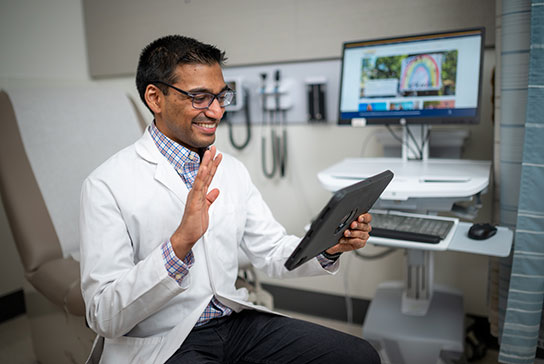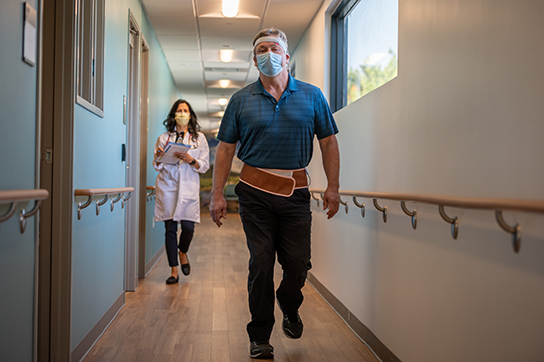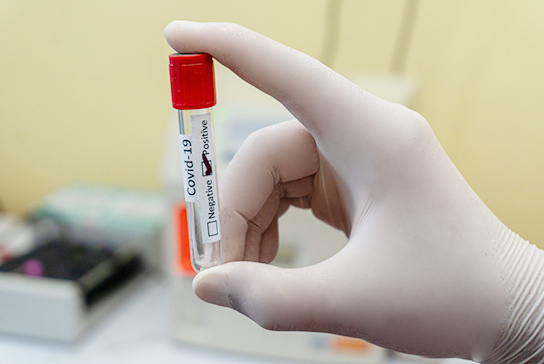Learn about available treatments if you get COVID-19.
COVID-19 Vaccines: Scheduling, How Vaccines Work, and More
Now offering this winter’s updated 2025-26 COVID and flu vaccinations
Last updated Sep. 25, 2025
UC Davis Health is offering this winter’s updated 2025-26 COVID and flu vaccinations as of Oct. 1, 2025. You can schedule your appointment via MyUCDavisHealth or by calling your clinic. For COVID, we are offering the Moderna vaccine.
If you are a UC Davis Health patient and want to get the 2025-26 vaccines before they are available here, you may continue to check with store pharmacies such as Walgreens or CVS. Or you can check with your local neighborhood pharmacy.
If you do get vaccines outside of UC Davis Health, please let us know so we can update your UC Davis Health medical record.
Flu vaccine information
More background
Advice about COVID vaccines may vary across federal, state, and local agencies. While there is no consensus, one trusted source to consider is the California Department of Public Health (CDPH) and its website.
On Sept. 17, 2025, CDPH announced official immunization recommendations in accordance with West Coast Health Alliance partners Oregon, Washington and Hawaii. That guidance, plus information about access and insurance coverage, is now available on the CDPH Public Health For All web page and its Q&A pages.
UC Davis Health is following guidelines from CDPH for both COVID and flu vaccinations. More information is available on the CDPH Public Health For All web page. All UC Davis Health primary care physicians practice in accordance with the above guidelines.
Additional information about COVID vaccines is available in the links below:
California Department of Public Health (CDPH) – A State of California government agency
Centers for Disease Control and Prevention (CDC) – A U.S. federal government agency
Scheduling Your COVID-19 Vaccine
Note as of Sept. 25, 2025: The information in the sections below was last reviewed and updated in mid-August 2025. Government COVID-19 vaccine rules and advice are in the process of actively changing. This may mean that some of the information in the sections below, and in the websites that it links to, may no longer be up to date. The most recent UC Davis Health vaccine and scheduling information is currently shown above this section, at the top of this web page.
Updated COVID-19 vaccines are available to anyone ages 6 months and older.
UC Davis Health patients can schedule any COVID-19 vaccine dose at UC Davis Health. Most appointments can be made on your MyUCDavisHealth portal or by calling 916-703-5555 Monday-Friday 8 a.m.–5 p.m.
If you've had a recent COVID-19 infection, the CDC recommends that you consider delaying your COVID-19 vaccine dose by 3 months after symptoms first appear or a positive test.
For those who are under 18 years old, they will need to have a parent or legal guardian provide consent for treatment at their appointment. UC Davis Health accepts written or verbal consent. It's also advised that anyone under age 18 have someone drive them to and from their appointment. With any vaccine, there's an increased risk of fainting for children under the age of 18, according to the CDC.
UC Davis Health has vaccines available for patients at many of our primary care clinics in:
- Auburn
- Carmichael
- Davis
- Elk Grove
- Folsom
- Rancho Cordova
- Rocklin
- Roseville
- Sacramento: Glassrock Building (Pediatrics), Midtown Ambulatory Care Center (Family Medicine and Pediatrics), Lawrence J. Ellison Ambulatory Care Center (Family Medicine and Internal Medicine)
Some vaccines are not available for all age groups and at all locations. Please check before you schedule your vaccine appointment.
See all of UC Davis Health's primary care clinic locations
You can schedule any COVID-19 vaccine dose (for those who are eligible, as specified by the CDC) at UC Davis Health. Appointments can be made on your MyUCDavisHealth account or by calling 916-703-5555 Monday-Friday 8 a.m.-5 p.m.
If you need to reschedule or cancel your vaccine appointment, please call our Patient Contact Center at 916-703-5555. The office is open Monday-Friday 8 a.m.-5 p.m.
Yes. UC Davis Health patients can schedule their next COVID-19 vaccine with us even if the last dose was administered somewhere else in the U.S. or in another country. Please bring record of your previous COVID-19 vaccine(s) or CDC vaccine card to your appointment.
To schedule a COVID-19 vaccine with UC Davis Health, go to MyUCDavisHealth or call 916-703-5555 Monday-Friday 8 a.m.-5 p.m.
Yes. COVID-19 vaccines are free to all Americans. However, vaccine providers can charge administration fees for giving the vaccine to people. Providers can get this fee reimbursed by a patient's private or public insurance company. For those who are uninsured, the Health Resources and Services Administration's Provider Relief Fund can reimburse the provider.
Yes. The state of California has a Digital COVID-19 Vaccine Record portal. You just need to enter a few details on their website to get a link to a QR code and digital copy of your COVID-19 vaccination record. If you want to share your proof of vaccination, you can use either the electronic version from the portal or the card you were given at time of vaccination.
Patients with MyUCDavisHealth accounts can also download a digital QR code containing certifiable COVID-19 vaccine or test result data. This is available on the MyUCDavisHealth app (be sure you have the most recent version of the app: version 9.7 or higher) and through MyUCDavisHealth online. Here are steps to find your QR code:
- Once you’re logged into MyUCDavisHealth, click on “Menu” and scroll down to select “COVID-19” (located under the “My Record” section).
- On this page, it will show vaccination and recent COVID-19 testing status. You will also see a button that says “QR codes” and a button to download a document (PDF) of your proof of vaccination.
- If you are not seeing these buttons, please make sure your version of the app is up-to-date.
- UC Davis Health clinical staff can print out a QR code for patients without a MyUCDavisHealth account.
Learn how to access your virtual COVID-19 vaccine record on MyUCDavisHealth
Uninsured: Yes, you can schedule a COVID-19 vaccine appointment without insurance. You will leave that field empty (or enter N/A) when scheduling your appointment. We may ask you some questions about your insurance coverage when you arrive, but this will not prevent you from being vaccinated.
Non-UC Davis Health insurance: Yes, you can schedule a COVID-19 vaccine appointment if your insurance does not cover UC Davis Health. You will leave that field empty (or enter N/A) when scheduling your appointment. Please bring your insurance card with you to your vaccination appointment.
There are three main COVID-19 vaccines: Pfizer-BioNTech, Moderna and Novavax. Both the Pfizer and Moderna vaccines are approved for ages 6 months and older.
The Pfizer and Moderna vaccines include a fragment of the mRNA that encodes for a certain portion of the coronavirus' spike protein. When the vaccine is given to us, our cells make that protein – a fragment of it – and then our bodies build an immune response to the protein.
The Novavax vaccine is available for ages 12 and older. The initial series of this vaccine is given in two doses. This vaccine contains pieces of the virus that causes COVID-19, but is a non-mRNA vaccine. It also contains a second ingredient called an adjuvant, which helps your immune system respond to the spike protein. This combination allows your immune system to learn and quickly respond to the actual spike protein if you were to become infected.
COVID-19 vaccines are available to anyone ages 6 months and older. There are different recommendations based on your age and other factors. The CDC has a breakdown of what you should know to stay up to date with your COVID-19 vaccine.
The most common side effects are a sore arm and sometimes fever, chills, tiredness and headaches for a day or two. Those are all signs your body is building an immune response.
The CDC says the risk of anaphylaxis – a severe allergic reaction – after a COVID-19 vaccine is extremely low. The people most at risk of an adverse reaction are those who have had severe allergic reactions to other medications or food.
There have been cases of inflammation of the heart — called myocarditis and pericarditis — happening after COVID-19 vaccination in the United States. These cases are rare, given the number of vaccine doses administered. The observed risk has been highest in males ages 12 through 24.
The rare risk of myocarditis and pericarditis can be reduced for some people by extending the interval to 8 weeks between first and second doses. COVID-19 vaccination is still recommended, given the greater risk of COVID-19 illness and related, possibly severe complications. The known and potential benefits of COVID-19 vaccination outweigh the known and potential risks, including the possible risk of myocarditis or pericarditis.
For children age 12 to 18, there is an increased risk of fainting after a COVID-19 vaccine, which is fairly common for adolescents after any vaccine, according to the CDC. For this reason, it is advised that anyone under age 18 have someone drive them to and from their vaccine appointment.
Learn more about what to expect after getting a COVID-19 vaccine
There is no way you can get COVID-19 from the vaccine. The novel coronavirus vaccine includes a small fragment of messenger RNA (mRNA) that encodes for a small portion of the protein. The mRNA can’t replicate, and it's very unstable so it doesn't last long. It can't cause COVID-19. None of the COVID-19 vaccines currently in development in the U.S. use the live virus that causes COVID-19.
We do not have long-term safety data of these COVID-19 vaccines since they have only been studied in humans for a few years. However, unexpected long-term safety issues have not been found in any licensed vaccines, even after decades of study. There are several vaccine safety monitoring systems in the U.S., and there will be expanded COVID-19 vaccine safety monitoring.
When to Contact Your Provider
If you have serious symptoms of illness, contact your primary care provider. UC Davis Health patients can use the MyUCDavisHealth symptom tracker to evaluate whether to seek help. Telehealth Express Care video visits are also available.
If you have a medical emergency, call 911 and notify them of your COVID-19 symptoms.
Ways to Seek Treatment
If you test positive for COVID-19 at home, you can contact your primary care provider about a prescription for Paxlovid.
UC Davis Health patients and non-patients can schedule a telehealth video visit with Express Care.
Visitor Policies
To help limit spread of COVID-19, we have policies for visits to our hospital and outpatient clinics.



